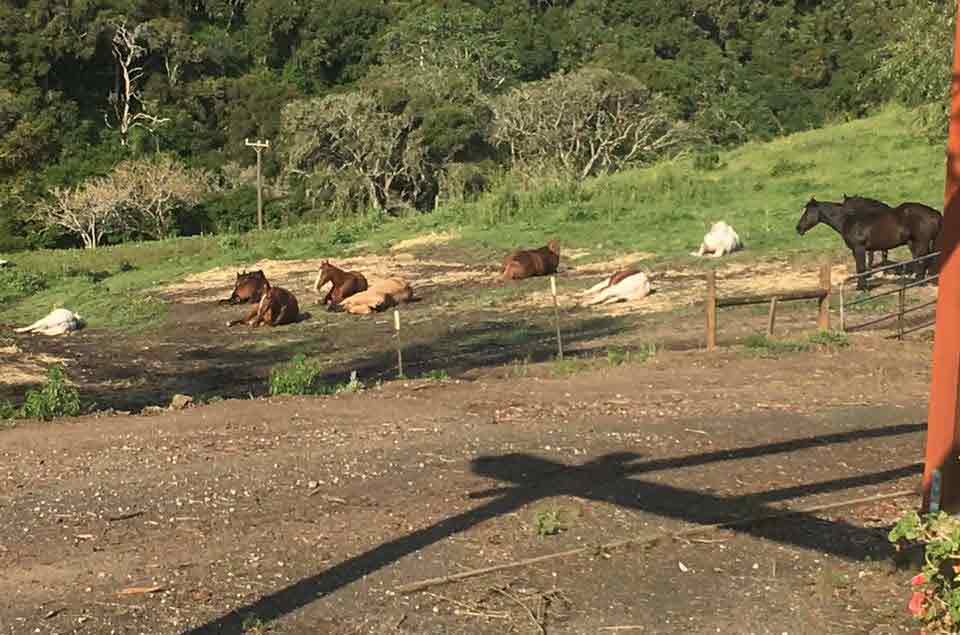On Sept. 25, Jennifer Galindo-Cole received a letter from Graniterock Co. letting her know that after 30 years leasing land for horse grazing in the San Juan Bautista area, she had 30 days to get her livestock off the property.
Now, she’s concerned that with such little time to respond, she may have to put down some of those horses.
“It puts me in a position that I’m going to have to make decisions with these animals that I wasn’t really prepared to make,” Galindo-Cole said in an interview this week.
She said she has pleaded with Graniterock’s marketing services manager, Keith Severson, and even had a lunch with him and two others representing the company. But she said her efforts have been unsuccessful, and the only hint she had gotten of a potential issue happened a couple weeks before she received the letter, when someone informed her there would be environmentalists on the property.
“I knew something was going on but I didn’t know what,” she said.

The issue underscores quandaries that can come about when large corporations lease grazing land to ranchers as part of a contract, especially one that allows termination with 30 days notice, and how fragile a ranch operation might be when partaking in such an agreement. In the case of Galindo-Cole, her family has kept 10 horses on the property for grazing among the 13 total they own.
Galindo-Cole mentioned how she has been there 14 years after taking it over from her parents.
Graniterock has explained the situation by noting how the construction company wants to use the land for environmental mitigation purposes, that it’s an ideal site for preservation of native species and how horse grazing would not be an appropriate use.
Severson said the timing of the company’s decision and 30-day notice to Galindo-Cole’s family had to do with a need to conduct testing on the property before the brunt of the rainy season hits. The company would use the land as part of environmental mitigation efforts and would set it aside in a state of conservancy.
“In that it would probably stay the way it is forever,” Severson said. “It means that apparently horses can’t graze on it.”
He went on: “We’re not doing anything with it other than looking at native species.”
Severson also noted how Graniterock has offered to help the Cole family find other land or place the horses with other rescues.
“We would need to know what she needs, how many acres and what kind of vegetation is required,” he said. “We still would entertain trying to find something else for her if we can do that.”
Galindo-Cole, however, said the short notice leaves her short of options.
“I am a rescue, and some of these horses, one of them, the Palomino, because of that horse I met my husband,” she said. “That horse deserves to live its life here. It’s really crappy.”
She said she can’t just turn around and find new homes for the livestock.
“It takes time to sell horses to good homes that aren’t going to end up back in slaughter line,” she said.
In the short term, the Graniterock decision will also more than triples her feed bill to get the horses off land grazing. That cost will go from $300 a month to over $1,000, she said.
“And horses need to eat,” she said. “They’re designed to graze. If horses don’t graze, they get sick. They’re actually meant to have food in their stomach at all times.”
She is especially upset at the short notice and believes she would have had at least three months to remove the horses if she had lived on the parcel.
“They dropped the ball,” she said of the company’s sudden communication.
She even asked if she could continue using part of the 88-acre property, but Graniterock wants to mitigate on all of it.
Severson underscored how the notice abides by the contract and said the company isn’t “thrilled” it feels the need to kick her horses off the property.
“We hadn’t before needed to examine some of this set-aside area. So we’ve always needed set-aside area. That’s why we own all the land. People lease it from us at mutually agreed upon terms. We’re not thrilled that we’re not able to make everybody happy. But we own lots and lots of land around. Everywhere we operate, we own a lot of land.”
Severson acknowledged there’s no requirement to start the mitigation this winter, but it’s the preferred option of Graniterock.
“Nobody’s holding a gun to our heads,” he said. “On the other hand, we do want to do it this year. We don’t want to do it next year in October.”
Severson called the situation unfortunate.
“Yes, its unfortunate,” he said. “Yes, it’s a rush. We’re also dealing with nature here, or a nature cycle. We’re just trying to do the best we can.”




